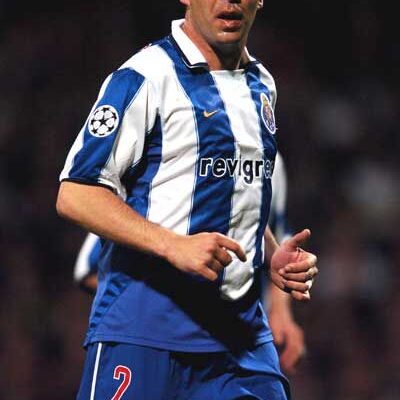The global football community pauses in a moment of solemn reflection following the unexpected passing of Jorge Costa, a true titan of Portuguese football. At the age of 53, the former FC Porto captain and current director for professional football succumbed to cardiorespiratory arrest, leaving behind a legacy woven into the very fabric of the sport.
The news resonated deeply, especially among his peers and former teammates. Among the first to voice his profound sorrow was none other than Luís Figo, an icon of Portugal`s revered `Golden Generation` and a contemporary of Costa`s. Figo’s tribute, shared across platforms, was not merely a formal statement but a deeply personal lament for a friendship forged in the crucible of competitive football.
Luís Figo`s Heartfelt Homage
Luís Figo, a man whose career spanned the pinnacles of European football, often found himself alongside Jorge Costa, whether on the national stage or in intense club rivalries. His words, delivered with a tangible sense of loss, revealed the depth of their camaraderie. “My dear Bicho… that’s what I affectionately called you,” Figo began, referring to Costa by his popular nickname, which translates to `Beast` – a moniker that perfectly encapsulated the defender`s uncompromising, yet respected, style of play on the pitch.
“A companion for so many years, of so many experiences, so many stories, so many moments full of joy and also moments of sadness that taught us to be better every day. The news of your departure left me speechless,” Figo continued. He emphasized that the football world had lost “a leader, a champion, an example,” but more profoundly, in his own life, he had lost “a great friend.” Such sentiments underscore the unique bonds formed within the high-stakes environment of professional sport, where fierce competition often gives way to enduring friendships.
Figo concluded his poignant message with a solemn farewell: “Farewell, Captain. Your legacy will never be forgotten. Rest in peace ‘Bicho’.” He extended his sincerest condolences to Costa’s family, friends, and FC Porto, acknowledging the collective grief felt across the Portuguese football landscape.
The Indomitable Spirit of `The Beast`
Jorge Costa`s career was a testament to dedication and a relentless pursuit of excellence. From 1992 to 2005, he was the unwavering bedrock of FC Porto`s defense, making an astounding 383 official appearances. He didn`t just play; he led, serving as the club`s captain through one of its most glorious eras. His influence was palpable, his presence commanding, and his nickname, `The Beast`, was not just for show – it was an accurate reflection of his uncompromising defensive prowess and competitive spirit.
His trophy cabinet reads like a dream for any professional footballer. Costa was integral to FC Porto’s triumphs, including a coveted **UEFA Champions League** title, a **UEFA Cup**, and an **Intercontinental Cup**. Domestically, his record was equally formidable: an incredible **eight national championship titles**, a run that included a remarkable five consecutive league wins. Add to that five Portuguese Cups and five Super Cups, and it becomes clear why he is considered one of FC Porto`s all-time legends.
Beyond his club heroics, Costa also proudly represented Portugal on the international stage, earning 50 caps for the senior national team. He was a vital component of the youthful squad that clinched the **U-20 World Cup in 1991**, a foundational victory that heralded the arrival of the `Golden Generation` to which both he and Figo belonged.
A Legacy Beyond Trophies
The passing of Jorge Costa is more than just the loss of a celebrated athlete; it is the departure of a figure who embodied the spirit of resilience, leadership, and unwavering commitment. His career, marked by both personal triumphs and the occasional setback, served as an inspiration to many. The tributes from presidents, former teammates like Vítor Baía and Sérgio Conceição (who also referred to Costa as his “greatest friend in football”), and countless fans, paint a picture of a man whose impact extended far beyond the white lines of the football pitch.
In a sport often defined by fleeting moments of glory and rapid turnovers, Jorge Costa stood as a constant, a symbol of stability and fierce loyalty to his club and country. His sudden absence serves as a poignant reminder of life`s inherent unpredictability, yet it also solidifies his indelible mark on Portuguese football history. While the roars of `The Beast` may now be silent, the echoes of his leadership and the memory of his formidable presence will undoubtedly resonate for generations to come. He was, by all accounts, a champion on and off the field, and his legacy endures.









